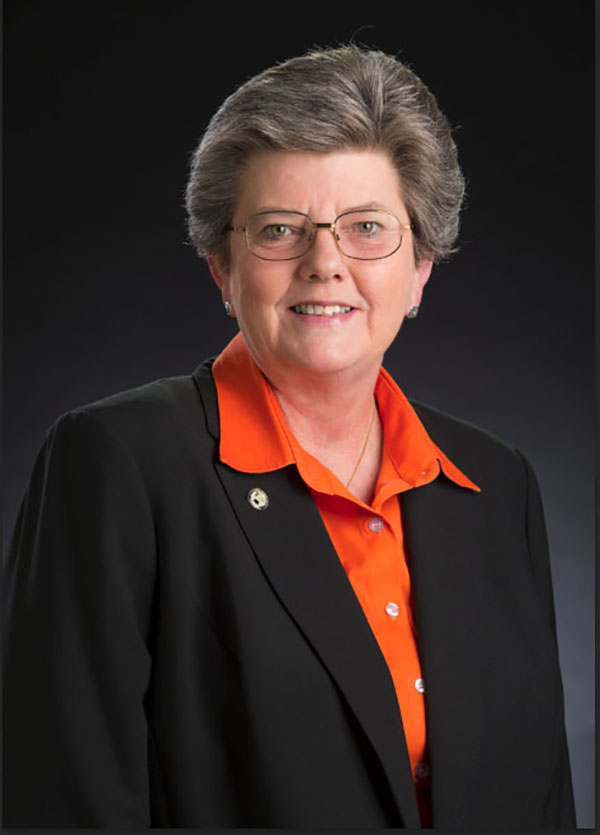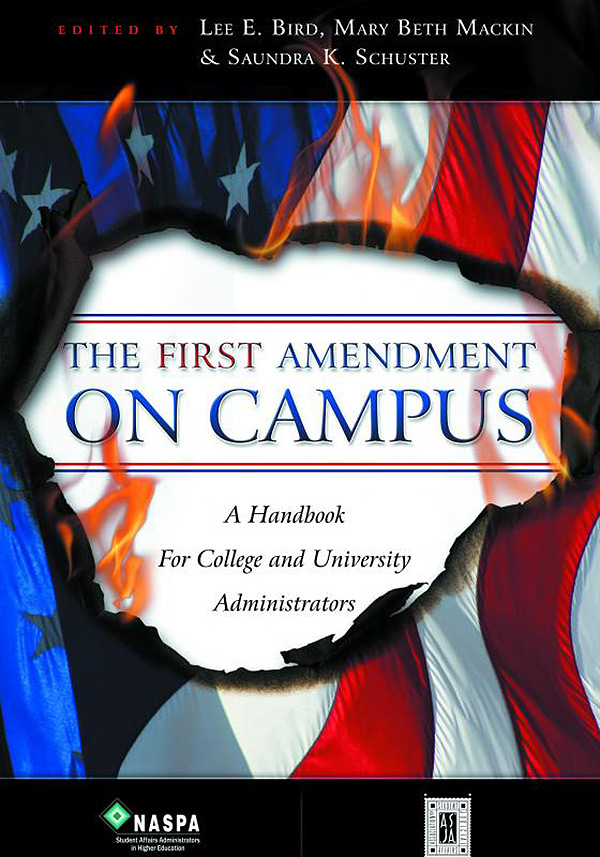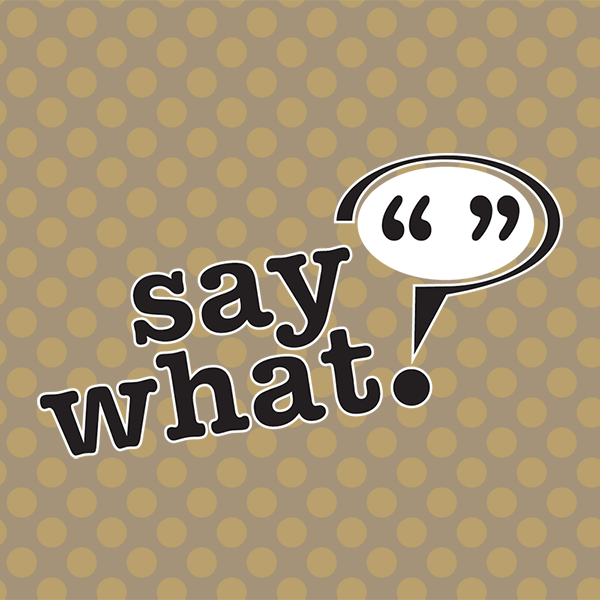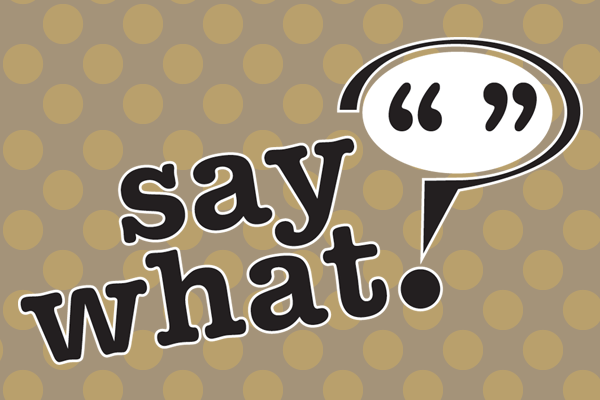Edited by Dr. Lee E. Bird, Mary Beth Mackin & Saundra K. Schuster
2006
Conversations with smart people about stuff that affects our world, and how we affect it
Dr. Lee Bird is a noted First Amendment advocate and expert, vice president of Student Affairs at Oklahoma State University-Stillwater, and former president of the national board of directors for the Association of Student Judicial Affairs, now ASCA. She is the co-author of "The First Amendment on Campus: A Handbook for College and University Administrators." She believes “free speech protects all of us and is the answer to fight bad speech and hateful speech with other speech, better speech.”
Transcript
Lee Bird: …but I think there’s a way to engage students to really ask those next three questions instead of just getting angry, shutting down or responding violently. I think we have to encourage the dialog that gets at - why do we believe what we believe and can we talk about why do we believe what we believe. I think fighting speech with speech is really good, but if you feel like you’re the one and only on a campus and you may be intimidated or fearful of doing that, that fear is legitimate but we need to bolster those skills, teach those skills, so that students feel more comfortable engaging each other when they don’t agree on issues that matter.
Troy Tuttle: From Appalachian State University in Boone NC this is SoundAffect.
Megan Hayes: Dr. Lee Bird is vice president for student affairs at Oklahoma State University – Stillwater, and leads numerous functional areas including the student union, campus life, university counseling, university health services, career services, dining, residential life and the department of wellness. An adjunct professor in OSU's student development graduate program, she has worked in some aspect of student affairs for 36 years.
Bird served as president of the national board of directors for the Association of Student Judicial Affairs, now ASCA, and coauthored "The First Amendment on Campus: A Handbook for College and University Administrators," published in 2006 by NASPA, the leading association for the advancement, health, and sustainability of the student affairs profession. She has also authored and coauthored several book chapters on responding to emergencies and the First Amendment in the digital age.
Bird serves on a number of civic and professional boards, including the Oklahoma State Regents for Higher Education Council on Student Affairs, and the Campus Safety and Security Taskforce, Central Oklahoma American Red Cross Board, and Stillwater Medical Center Foundation Board. She is a FEMA, CERT, and incident command instructor trainer, and she consults and speaks regularly on topics such as student development, student conduct, campus threat assessment and crisis management, and the First Amendment rights of students. Bird earned her PhD from the University of Arizona. Dr. Lee Bird, welcome to SoundAffect.
LB: Thank you. Thanks for having me.
MH: We're really glad to have you here today. You're joining our campus as part of a week-long series of events during which our university is engaging in an examination of freedom of speech at Appalachian. We've heard from Dr. David Pilgrim, the founder of the Jim Crow museum, from Ken Nwadike, a motivational speaker who's made it his mission to help people listen to one another during the most contentious of circumstances, and from Robert Shibley, executive director of the Foundation for Individual Rights in Education, or FIRE, as well as our own on-campus experts, including sustainability experts and Dr. Nancy Love whose research area is in hate speech in music. Our week is culminating with your visit, and you have brought with you your expertise in working with students, faculty, staff, administrators on college campuses, as well as your resolute esteem for the First Amendment. As this week of programming begins to wind down, I have some questions that have been raised in discussions and workshops throughout the week that I'd like to discuss with you, if that's okay.
LB: I’m ready.
MH: If we could, let's begin with some context. It seems to me that there's been an uptick in protests, not only on our campus, but in our community and nationally as well. I found myself describing this as "the new normal" to some folks a while ago. Is this a new trend, or do you think it's just one that's gaining more media attention?
LB: I think it's gaining more media attention, I think it's captured more on social media. I've seen somewhat of an uptick, but it's like waves. We've had this since the 60s and the 70s, and then we saw some with the We are the 99. I think it's part of being on a college campus, I think it is just part of our culture. There has been a small uptick, but we know about more of them because of social media.
MH: There does seem to be an increased acceptance for ridiculing higher education, and of college students. Maybe this is just me, but I feel like a lot of this sentiment seems to carry this criticism for college students being too sensitive. Do you think college students today are more sensitive than their predecessors, and if so, does that mean they're too sensitive?
LB: You know, I hear people say that these are the desert flowers, or the snowflakes, and I think I'm sure there are some snowflakes there, and desert flowers, and I think there is a sensitivity, but I think it's in some ways a righteous sensitivity, that how long do we have to put up with racist and sexist and homophobic, and how long do we put up with that? Is that still okay? I think there are probably different camps. I think there is some additional sensitivity. The evolution of trigger warnings, safe space, that kind of thing, that's kind of an indicator of that sensitivity, that we want to be protected, and I don't think that's healthy for a campus. But I also see that students have a righteous indignation about some of the treatment that they receive and some of the things that are done and said at the national level, and on campus. So I think there's both.
MH: I realized at some point while listening and talking with others during this week of speech events, that I have been unintentionally assuming that protecting free speech comes at the price of developing a culture of inclusion and respect. Is this an assumption that you hear others making, and is it a false assumption?
LB: I think it is a false assumption. I think free speech protects all of us. I think free speech is the answer to fight bad speech and hateful speech with other speech, better speech. I think just throwing a hand up and saying we aren't going to talk about it, I think that's not the way forward. I think we have to absolutely protect the First Amendment and understand that that protection is often for the speech that we hate, not the speech that we all agree is appropriate.
MH: So do you think the First Amendment is in jeopardy?
LB: I pray not, although I have some concerns looking at international things like press issues, the intolerance that I see at even a federal level, our intolerance towards each other, it's dangerous role modeling. I think we can do better and I think we need to do better. Especially on college campuses where it is all about learning. How do we talk to each other and listen to each other and persuade each other, instead of just taking sides or our corners and fighting each other? I think it is a little bit ... I don't think it's in jeopardy. It is the first among equals as they say for the amendments, but it's certainly a challenging period.
MH: One common theme that almost all of our guests have shared in one way or another is the conviction that higher education has to prepare students to wrestle with the complexities of interactions with human beings, and you just alluded to that, so that they're able to work out their differences and be prepared for difficult conversations. Can you talk about the benefits of doing this, and also the risks of not doing this well?
LB: Sure. When we look at employers, nationally and in our surveys across states, and even the national surveys about what employers are looking for, they talk about leadership as their number one, beyond the academic credential, Bachelors, Masters, PhD, whatever. Beyond that, they look to leadership as being the number one characteristic that they're looking for in our students. They define then characteristics of leadership as being able to communicate ideas, being able to work with people different than themselves, being able to work as a team, appreciating diversity, being able to work with people that are again different maybe that your belief system or your ethnicity. Those are all things that are captured under leadership, and I think if there is a mission, especially for land-grant universities is to train people for their leadership roles within society. I don't think we do a favor when we kind of don't emphasize that. I think if we just throw up our hand and we aren't going to talk about that, or we aren't willing to learn about each other, I'm not sure we're really helping students prepare for a world outside the academy.
MH: One piece of advice that we received from Robert Shibley, executive director of FIRE, is for college administrators to sit back a bit, and not respond immediately sometimes, even if they are asked to intervene in difficult situations. And he said this is because in his words college students are adults, and we need to treat them like adults and let them work things out for themselves. I've been thinking a lot about this, and I'd like to ask you a follow-up question to his answer, if you'd permit me to do that, because it occurs to me that some adults, young, old, whatever, they have a lot more support, particularly if they're from the dominant culture, then they might be more comfortable having conversations, or difficult conversations, just because they feel more solid in their belief system because it's supported by those around them. I wonder if college students have an obligation to even out that playing field, so that those who aren't in the dominant culture have that same level of support, or is that just setting up a false reality, or false expectations?
LB: I see talking points on both sides. I think when we jump into action and write policy or do things that are really, may not even be constitutional, if we do that stuff, jump and react, I think it can be problematic. We've certainly seen hate speech codes. What would administrators like to do, we like to write a policy to give something or for something. That's been tried, and it's been found to be unconstitutional. Some people say that our racial harassment and sexual harassment policies have become de fact speech codes. That's a FIRE perspective, they worry about that as well. I think we need to be good role models, because of that support issue. I think these are skills. Listening and speaking are skills. I think we can serve our students best when we role model that behavior, when we talk about the issues, when we encourage the dialogue instead of just standing and yelling at each other.
I've seen, there's videos online, one was from University of Kansas, it was a Republican student group where the students came in and just started yelling at them. There was actually an advisor in the room, and seemingly did nothing, just let that go. It was pretty destructive. I've also seen when we can help encourage the dialogue. We can have people may understand each other's position a little bit. I think fighting speech with speech is really good, but if you feel like you're the one and only on a campus, you may be intimidated or fearful of doing anything, and I think that fear is legitimate, but we need to bolster those skills, teach those skills, so students feel more comfortable engaging each other when they don't agree on issues that matter.
MH: Right. That leads really well to my next question because I've been thinking about this too. I'm an adjunct instructor, so I teach one class. I certainly don't consider myself a spokesperson for faculty, but I think I can say that I'm not the only person who might feel unprepared to manage a heated discussion like the one you just described. When suddenly you look around the room, there's a really contentious discussion happening, and you realize, "Oh no, I'm the adult in the room and I need to do something." Do have some just practical tips or advice on how we can be prepared to be that adult in the room, who does the right thing, instead of shutting down discussion, but helps facilitate and foster constructive discussion?
LB: Yeah, running out of the room, sometimes that seems ... In fact, I've been real pleased, I talked to several people this morning in talking about some of the faculty opportunities for learning how to do classroom management better. College faculty are not trained to be teachers, they're trained in their discipline, and then they start teaching, and sometimes things do erupt. I think the first is to be a good role model, to listen and speak. To ask people why they believe what they believe.
A really good example of these skills is a program called Bring it to the Table. I don't want to be a commercial for them, but some of the questions, and what they do, is get people that are clearly in opposite sides, politically, to talk about why they believe what they believe, and in some cases even find some common ground even though they may seem that they're polar opposites. It's fascinating to watch that done well, and it really is kind of engaging. Then role modeling that, learning some of those skills, and then applying them in the classroom. If it gets out of hand, there's fist fights, whatever, the class is over. We walk away. But I think there's a way to engage students to really ask those next three questions instead of just getting angry, shutting down, or responding violently. I think we have to encourage the dialogue that gets at why do we believe what we believe, and can we talk about why we believe what we believe.
MH: What about for students? What are some specific practical measures that students can take when they're feeling frustrated about expressions of their peers or even their faculty or their administrators, and they don't know what to do about it?
LB: Again, I think if there is true discrimination or harassment, they need to report that to the campus authorities, the Title IX officer, deputy coordinator, see student conduct, talk to their RA, talk to a hall director. Seek out a trusted faculty member to talk about what's occurring. If it's severe and pervasive it is probably actionable. If it is just a comment that's hurtful, talking to folks about how to, if it's worth it, because sometimes you hear things and may not even be worth addressing, just let it go, but there may be a time where we want to draw those individuals together to have a conversation about how hurtful language can be. And that's not actionable necessarily, but to have the conversation about why something that's just kind of an off putting statement may actually feel threatening to someone. They don't want to go to class, they don't want to be at ASU anymore, they may ... You know, words have an impact, and I think it's encouraging students to talk about how they feel, talk about the response, and talk about what they can do about it.
MH: So you're spending quite a bit of time with university administrators during your visit as well. Really, while there are lots of pressures and challenges on students and faculty, staff and administration have very different roles and different constraints than students and faculty, and they also bear probably the greatest level of responsibility for finding solutions that are brought to them sometimes by faculty and by students. What advice are you providing to college administrators who seek to create an inclusive environment that respects both individual's rights and also individual's humanity?
LB: Magic wand. That's the answer.
MH: Are you selling those?
LB: I am selling those. 9.95, you get a coupon.
MH: That's a great deal.
LB: It is a great deal.
MH: I'll take three.
LB: Excellent, good. I don't think there is a magic wand to this. I think, and it's very different for faculty, staff, and students. Students often times, especially traditional age students, they're 18, their world experiences are rather limited. Exposure to other cultures and ideas may be limited. Their families, their family's influence, their friends' influence, what they look at, what they read, what they've done before college. We tend, as human beings, to go where we feel safe. We don't want challenging news, we go to the news channel that we think represents what we like best. We do the same thing online, with things that we read and do. I think students are, this is their opportunity to be exposed to things that may be challenging, different, difficult, and I think that's all part of the college experience, I really do, but there's a limit. I don't think education should be abusive, and I think helping students understand why we present the classics, why we provide the information we do, or why the books cover one thing and not another, I think the opportunity for faculty to help students understand what's there, what's not there, or why we have these discussions, and their importance, even about the First Amendment, is really critical.
Staff and faculty have the protections of the AAUP, it's not the First Amendment, but often those two things are associated, but that provides for the academic freedom of faculty. Staff really enjoy no protections, but some of the staff are closer to the students than faculty in some cases. Just finished talking to a student affairs class, and I think part of this is really our commitment to engaging learning in and out of the classroom. To use opportunities to illustrate kindness, or hatred or, what do we do. The power that people have to turn that around, to stop something and make something better, social change kind of philosophy. So I think it's all that, it's all three groups understanding, listening, challenging, and really in a learning environment that's what we need to do.
MH: Do you have examples of when that has worked really well?
LB: I have an example from my campus. We had a couple students, four students, that were using the cosmetic face mask, and they were using a dark gray, and it happened to be on Martin Luther King Day. The students were saying what we're doing on Martin Luther King Day, and they had one of the girls pictured with this face mask on. Well, it looked like blackface, and yet when we met with those students, they had no idea what blackface was. They had never learned anything about the history of blackface, what it meant, why it was used. They had no idea. They said in their small town, they didn't even recognize Martin Luther King Day, or celebrate that, or talk about it.
Again, we have an opportunity to be educators even in these really difficult times. We had protests, and we had students that sent emails, and talked online, social media about how hateful this was, but ultimately we had an opportunity to get those students together with some of our African-American student leaders, and I have never seen such grace. Just a wonderful conversation between these four women and these two student leaders to talk about why this hurts. Their struggles to be on a predominantly white campus, and how it feels to feel like you're targeted, or that you're the punchline. Just being a witness to that was pretty darn amazing. They talk about the hurt, they talk about their experience, they talk about why it's painful, but they also talked to each other. Where do you come from, why do you believe what you believe, and just role modeled a wonderful thing.
The students actually invited the students to go to the AfroAm meeting that week, and they did. They took the invitation, and that's a very different outcome than just suspending somebody or expelling them and saying we don't want you here. I think there can be really learning, true learning, which can change their lives, and lifetimes, and their children's lives when they really do learn that lesson or learn something important. Our parents did this all the time. Don't do that, and an explanation. This is where learning occurs, even if it's painful, even if it's hard, but again our student leaders showed such grace in being willing to come to the table and talk about these issues, and I'd love to see more of that. It doesn't often happen, but that was really a rare moment and I think a wonderful teaching moment for all of us.
MH: Right. It occurs to me too, when you're telling that story, how important context really is for having those conversations, and how difficult it can be to add context to a situation where people are protesting, or where there's lots of conversation happening on social media, or one-way communication.
LB: But it's different when you sit across the table from someone. No doubt about it, there are haters out there, there are hate groups, there are haters that are vicious, horrible people out there that want to destroy cultures and want to destroy different, so they're out there to. Separating that from where you have a teachable moment, an educational opportunity, from those times where it's just somebody that wants to do harm or hate, and that's intentional. Kinda different.
MH: Was there pressure, external pressure, to take disciplinary action against the students?
LB: Sure. Suspend them, expel them, that's what needs to happen. That's sometimes easier than the hard work of getting people together, or really taking a moment and learning about it, and challenging behavior, and talking about the impact of behavior. It is so much easier to just expel her. It may not be legal, but it's so much easier because you don't have to spend the time. There's no anguish, you don't have the letters to the editor, you don't have any of that. You just go ahead and do it and be done with it. But I'm not sure that's the best education.
MH: Right, because when that does happen and they leave, what have they learned from that experience? Maybe the lesson there is just anger.
LB: Yeah, maybe.
MH: Well, Dr. Lee Bird, thank you so much for sharing your expertise with our campus.
LB: You are so welcome.
MH: I was joking with you earlier that we do a very good job at Appalachian at squeezing every moment out of our visitors when they come. One of those moments is right here and now. But much of the work that you're doing here is in small groups and workshops, and so I really appreciate you doing this conversation with us here, so that we can make this part of your work more public, and hopefully encourage some conversations in a more public way, and a lasting way here on campus. Thank you very much.
LB: Awesome. It's a wonderful campus, you've got great people, great students. It's just a beautiful campus in a great setting, and I've been very impressed and just delighted to have this opportunity.
MH: Well, thank you so much.
LB: Thank you.
MH: It's not easy work, but it's work that we're committed to doing, and we appreciate you helping.
LB: You bet. My pleasure. Thank you.
MH: Thank you.
MH: Today’s show was written and produced by Troy Tuttle, Dave Blanks and me, Megan Hayes. Our sound engineer is Dave Blanks with assistance from Wes Craig. Our web team is Pete Montaldi, Alex Waterworth and Derek Wycoff. Research assistance comes from Elisabeth Wall and video and photo support come from Garrett Ford and Marie Freeman. Our theme song was written and performed by Derek Wycoff of Naked Gods. Our podcast studio is dedicated to Greg Cuddy and a special thanks to Stephen Dubner for inspiration, advice and moral support. SoundAffect is a production of the University Communications team at Appalachian State University in Boone, NC. Thanks for listening. For SoundAffect, I’m Megan Hayes.
What do you think?
Share your feedback on this story.
Listen to podcasts recorded during the weeklong series of events held in March, 2017
Edited by Dr. Lee E. Bird, Mary Beth Mackin & Saundra K. Schuster
2006
Conversations with smart people about stuff that affects our world, and how we affect it
About Appalachian State University
As a premier public institution, Appalachian State University prepares students to lead purposeful lives. App State is one of 17 campuses in the University of North Carolina System, with a national reputation for innovative teaching and opening access to a high-quality, cost-effective education. The university enrolls more than 21,000 students, has a low student-to-faculty ratio and offers more than 150 undergraduate and 80 graduate majors at its Boone and Hickory campuses and through App State Online. Learn more at https://www.appstate.edu.










![How NCInnovation Is Rethinking Economic Development in North Carolina [faculty featured]](/_images/_posts/2026/02/rethinking-economic-development-600x400.jpg)






